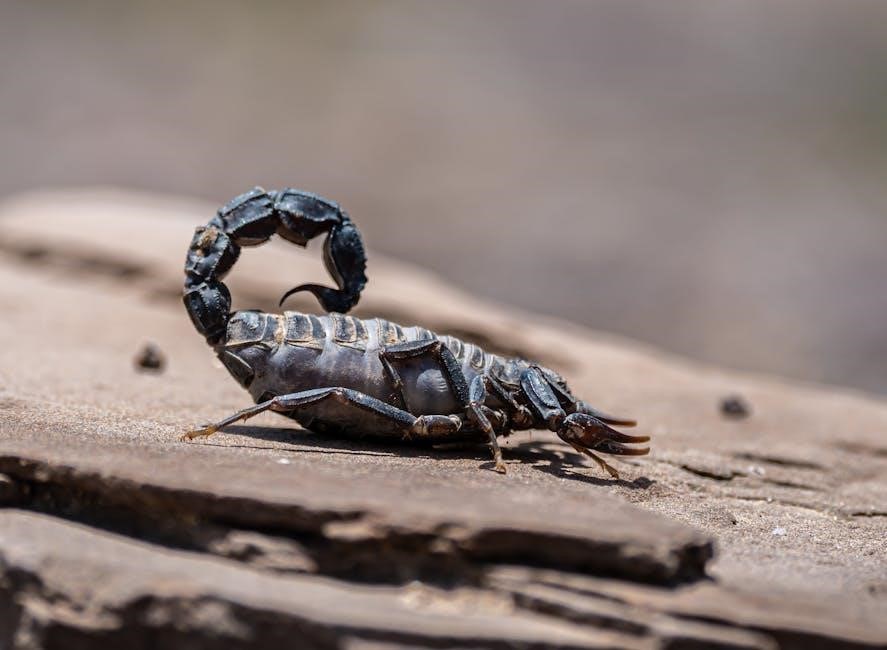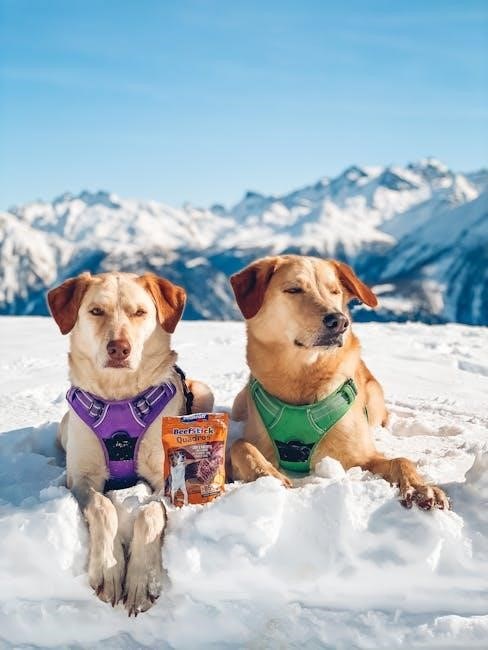Some human foods‚ while harmless to us‚ can be toxic or even fatal for dogs due to their unique metabolism. Common culprits include chocolate‚ onions‚ garlic‚ grapes‚ and xylitol. Awareness of these dangers is crucial to protect your pet.

Chocolate and Caffeine
Chocolate and caffeine are highly toxic to dogs due to a compound called theobromine‚ which is a cardiac stimulant and diuretic. Dogs metabolize theobromine slowly‚ leading to toxic buildup. Dark chocolate and baking chocolate contain higher levels of theobromine than milk or white chocolate‚ making them more dangerous. Symptoms of poisoning include vomiting‚ diarrhea‚ increased heart rate‚ restlessness‚ and‚ in severe cases‚ seizures or heart failure. Even small amounts can be harmful‚ so it’s crucial to keep all chocolate and caffeinated products out of your dog’s reach. If you suspect your dog has ingested chocolate‚ contact your veterinarian immediately for guidance. Prompt treatment is essential to prevent serious health complications. Always err on the side of caution‚ as early intervention can make a significant difference in your dog’s recovery. Remember‚ no amount of chocolate is safe for dogs‚ so it’s best to avoid sharing any treats containing cocoa altogether.

Onions and Garlic
Onions and garlic belong to the Allium family and contain a compound called thiosulphate‚ which is toxic to dogs. Both can cause damage to a dog’s red blood cells‚ leading to anemia. Onions are particularly dangerous‚ as they contain higher concentrations of thiosulphate compared to garlic. Even small amounts can be harmful‚ and the effects are cumulative‚ meaning repeated exposure worsens the toxicity. Symptoms of poisoning include vomiting‚ diarrhea‚ lethargy‚ and pale gums. In severe cases‚ it can lead to organ failure. Cooked‚ raw‚ or powdered forms of onions and garlic are equally dangerous‚ and even foods seasoned with these ingredients can pose a risk. If you suspect your dog has ingested onions or garlic‚ contact your veterinarian immediately for advice. Early treatment is crucial to manage symptoms and prevent long-term health issues. Always keep these foods out of your dog’s reach to ensure their safety.

Grapes and Raisins
Grapes and raisins are among the most toxic foods for dogs‚ though the exact reason for their toxicity remains unknown. Even small amounts can cause severe health issues‚ including kidney failure‚ which can be life-threatening. Symptoms of poisoning may include vomiting‚ diarrhea‚ lethargy‚ and a lack of appetite. In severe cases‚ dogs may experience dehydration‚ increased heart rate‚ and seizures. Raisins‚ being dried grapes‚ are particularly concentrated‚ making them even more dangerous. It is essential to keep all forms of grapes and raisins out of your dog’s reach‚ as there is no safe amount for consumption. If you suspect your dog has ingested grapes or raisins‚ contact your veterinarian immediately for emergency care. Prompt treatment‚ such as inducing vomiting or administering activated charcoal‚ can help prevent long-term damage. Always prioritize your dog’s safety by avoiding these foods entirely.

Caffeine and Coffee
Caffeine‚ found in coffee‚ tea‚ energy drinks‚ and some medications‚ is highly toxic to dogs. It belongs to the methylxanthine family‚ which can cause severe health issues in canines. Even small amounts can lead to hyperactivity‚ restlessness‚ and an increased heart rate. In more severe cases‚ caffeine ingestion can result in vomiting‚ diarrhea‚ high blood pressure‚ and even heart arrhythmias or seizures. Dogs metabolize caffeine slowly‚ so symptoms may worsen over time. Coffee beans and brewed coffee are particularly dangerous due to their concentrated caffeine content. If your dog accidentally ingests any caffeinated product‚ it is crucial to seek veterinary help immediately. Treatment may include inducing vomiting‚ administering activated charcoal‚ or providing supportive care to manage symptoms. Keep all caffeinated beverages and products well out of your dog’s reach to prevent accidental ingestion and ensure their safety.

Xylitol and Sugar-Free Products
Xylitol‚ a sugar substitute commonly found in sugar-free gum‚ candies‚ baked goods‚ and even peanut butter‚ is highly toxic to dogs. It causes a rapid drop in blood sugar and can lead to liver failure. Symptoms include vomiting‚ lethargy‚ and seizures. Always check labels for xylitol to keep your dog safe.

Alcoholic Beverages
Alcoholic beverages are highly toxic to dogs‚ as their bodies are unable to process alcohol efficiently. Even small amounts can lead to severe health issues‚ including vomiting‚ diarrhea‚ and central nervous system depression. Ethanol‚ the active ingredient in alcohol‚ is particularly dangerous and can cause rapid intoxication in dogs.
The severity of symptoms depends on the amount and concentration of alcohol consumed‚ as well as the dog’s size and weight. In severe cases‚ alcohol poisoning can lead to respiratory failure‚ coma‚ or even death. Common sources of alcohol exposure include beer‚ wine‚ liquor‚ and fermented foods like yeast dough.
If you suspect your dog has ingested alcohol‚ it is crucial to contact a veterinarian immediately. Prompt treatment‚ such as inducing vomiting or administering activated charcoal‚ may be necessary to prevent serious complications. Always keep alcoholic beverages and products out of your dog’s reach to avoid accidental ingestion.
Preventing exposure is the best way to protect your dog from the dangers of alcohol. Be mindful of your surroundings‚ especially during social gatherings‚ and ensure your pet is supervised at all times. Awareness and vigilance are key to keeping your furry friend safe and healthy.

Cooked Bones
Cooked bones are a hidden danger for dogs‚ as they become brittle and prone to splintering when chewed. These sharp fragments can cause serious internal injuries‚ including punctures in the mouth‚ throat‚ digestive tract‚ or intestines.
The splintered bones can lead to severe pain‚ internal bleeding‚ and potentially life-threatening complications. Additionally‚ fragments may become lodged in the digestive system‚ requiring surgical intervention to remove. Even small bone shards can cause irritation and inflammation in the stomach and intestines.
While raw bones are often considered a safer alternative‚ they also pose risks‚ such as bacterial contamination from pathogens like Salmonella or E. coli. Dogs may also choke on large bone pieces or experience dental fractures from chewing hard bones;
Veterinarians recommend avoiding cooked or raw bones altogether and instead offering safe‚ durable chew toys or dental chews specifically designed for dogs. Supervising your dog during meal preparation and securing trash cans can help prevent accidental ingestion of cooked bones.
Be aware of the risks and keep cooked bones out of reach to protect your dog from unnecessary harm and costly veterinary emergencies. Always prioritize your pet’s safety by choosing appropriate‚ bone-free treats and toys.
Macadamia Nuts
Macadamia nuts are highly toxic to dogs and can cause a range of symptoms‚ including weakness‚ depression‚ vomiting‚ tremors‚ and hyperthermia. These symptoms typically appear within 3 to 12 hours after ingestion. The exact toxin in macadamia nuts is unknown‚ but it affects the nervous system‚ muscles‚ and digestive system.
Even small amounts of macadamia nuts can be harmful‚ and the severity of the reaction depends on the size of the dog and the quantity consumed; If you suspect your dog has eaten macadamia nuts‚ it’s crucial to contact your veterinarian immediately for advice. In most cases‚ symptoms resolve within 24 to 48 hours with supportive care‚ but hospitalization may be necessary in severe cases;
While macadamia nuts are not usually fatal‚ they can cause significant discomfort and stress for your dog. It’s essential to keep all macadamia nuts and products containing them out of your dog’s reach to prevent accidental ingestion. Always prioritize your pet’s safety by being aware of these hidden dangers in everyday foods.

Emergency Steps if Your Dog Ingests Toxic Food
If your dog ingests toxic food‚ act quickly to minimize harm. Stay calm and contact your veterinarian‚ a pet poison hotline‚ or the ASPCA Animal Poison Control Center immediately. Provide details about the food consumed‚ the amount‚ and the time of ingestion.
Do not induce vomiting unless instructed by a professional‚ as some substances can cause more harm when vomited. Secure any remaining toxic material for identification. Keep your dog calm and comfortable to prevent stress‚ which can worsen symptoms.
Your veterinarian may recommend treatment‚ such as activated charcoal to absorb toxins or supportive care to manage symptoms. In severe cases‚ hospitalization may be necessary. Early intervention is critical to preventing long-term damage or complications.
Monitor your dog closely for signs of distress‚ such as vomiting‚ lethargy‚ tremors‚ or difficulty breathing‚ and report any changes to your vet. Prompt action can significantly improve your dog’s prognosis and ensure their safety.
Protecting your dog from toxic foods requires awareness and vigilance. Many common household items‚ such as chocolate‚ onions‚ grapes‚ and sugar-free products‚ can be harmful or even fatal to dogs due to their unique metabolism.
Prevention is key: store toxic foods out of reach‚ educate family members‚ and avoid sharing human foods unless you are certain they are safe. If you suspect your dog has ingested something toxic‚ act quickly by contacting your veterinarian or a pet poison hotline for guidance.
Stay informed about the latest list of toxic foods and substances to ensure your dog’s safety. By taking these precautions‚ you can help prevent accidents and provide a healthy‚ secure environment for your furry companion.
Remember‚ your dog’s well-being depends on your awareness and responsible choices. Always prioritize their safety and seek professional advice if unsure about any food or product.
